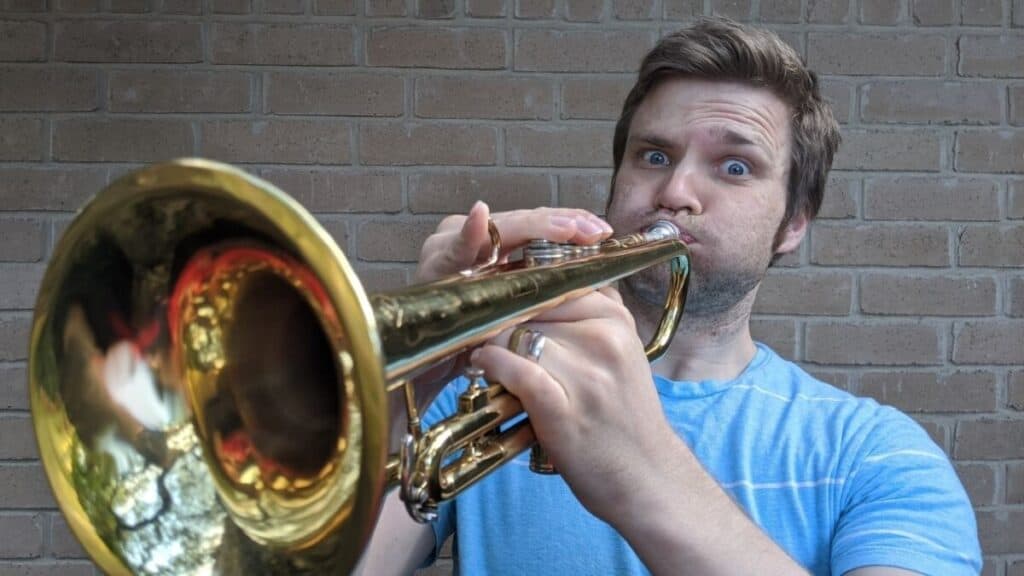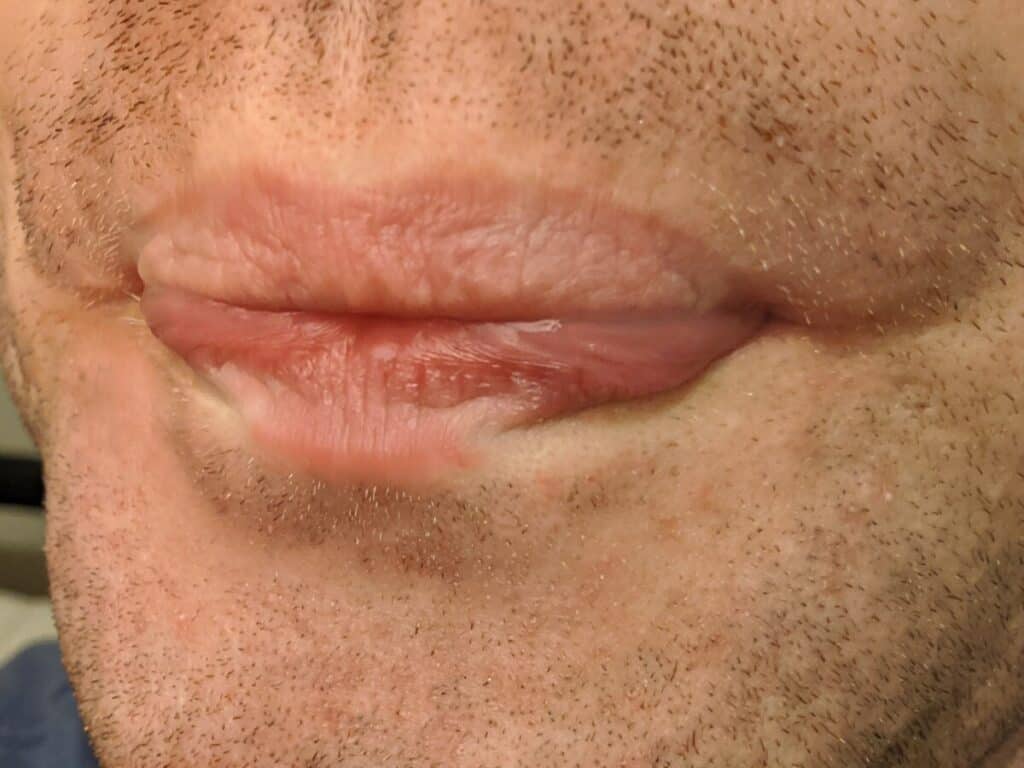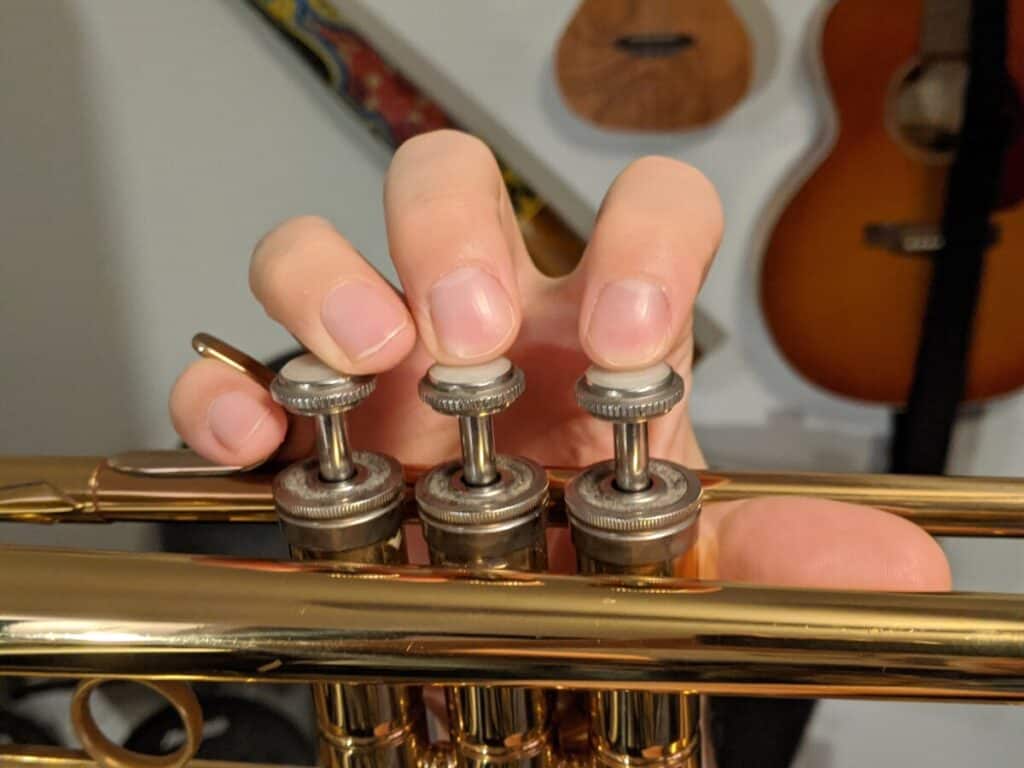This post contains affiliate links. We earn commissions if you purchase products from retailers after clicking on a link from our site. As an Amazon Associate, we earn from qualifying purchases.
You have probably heard many times that the trumpet is one of the most difficult instruments to play. Maybe you play the saxophone and you’re wondering where the famous trumpet ego comes from, or maybe you’re thinking about learning the trumpet. Either way, there’s something to what people say about it, let’s learn why.

By the way, looking for recording equipment and musical instruments? Check out Sweetwater.com for microphones, monitors, audio interface or any other recording gear that you could ever need. (Affiliate Link)
The trumpet is considered a difficult instrument because the sound of the trumpet is reliant on the delicate embouchure. The brass embouchure, particularly the trumpet embouchure, must be capable of producing frequencies upwards of 1000 HZ.
What does that even mean? Well, don’t worry, I’ll go into detail of what exactly is difficult.
What Makes the Trumpet So Difficult?
This is a totally understandable question–I remember when I first started playing trumpet I thought it would be much easier than playing piano because the trumpet is only capable of playing one note at a time.
A piano player can play 10 notes at once! So isn’t piano way harder than trumpet?
Who Makes The Sound
Music is practically the same as vibration. The way sound works is vibrating air (or another medium… bone-induction headphones prove that. Link to Amazon).
The vibration from an instrument vibrates the air which in turn vibrates our ear drum which in turn vibrates our inner ear’s cochlea which in turn excites nerves that our brain can understand.
For a trumpet to make sound, the trumpet player’s lips must produce the vibration.
It helps to understand the challenge here if we compare what is required of a trumpet player vs. other instruments.
- For a saxophone or clarinet player, the player’s breath moves a wooden reed back and forth. The reed is what is vibrating back and forth to create the sound
- For a flute player, their breath causes wind oscillation within the instrument, and so the flute player controls the pitch by wind speed. This is true of concert flutes and other flutes like the recorder or the tin whistle. (check my page out to see the difference between the two)
- A piano player presses a key and the piano strikes a string with a hammer which produces the sound
- A guitar player plucks a string which vibrates and produces the sound
- A drummer strikes a taut drum head and the vibrating drum head vibrates the air which produces the sound
- A melodica player (check out what a melodica is here in my post) breathes through an aperture and presses a key to pass through tuned reeds to make the sound
- A harmonica player works very similarly to a melodica. The player blows through an aperture which vibrates a reed which makes the sound
In all these examples, and most examples of other instruments, the player provides the power through wind or through kinetic energy (like pressing a key on a piano) which vibrates something else which produces the sound.
A trumpet player provides the wind power and the vibration themselves with their lips. This is true for all lip-reed instruments (Any brass instrument as well as the didgeridoo).

Why Is The Trumpet Embouchure So Tough?
Well, that seems reasonable. The trumpet player is responsible for the vibration which produces the sound. Big whoop, right? Why does that matter?
Excellent question. What’s especially difficult about the trumpet is that it has a much higher range than other brass instruments. The tuba and the trombones are at a much lower register than the trumpet.
As a quick comparison, here are some other brass instrument ranges from orchestralibrary.com
- Trumpet: F#3-D6 (And higher. You will see High Gs in music now and again
- Trombone: E2-F5
- Tuba: D1-F4
Does lower mean easier to play necessarily? Definitely not. Low instruments have their own challenges, particularly with breath support.
Again, so what? Why are higher notes hard to play?
As you play higher, the trumpet player has to buzz higher frequencies. To play High C, the trumpet player has to buzz around 1046 times per second!
To be able to play this frequency takes an enormous amount of practice. In fact, culturally, being able to “hit the high notes” is a huge deal for many trumpet player.
The embouchure is so complicated that there are entire books and theories written specifically for training an embouchure. Not all experts agree on the best system for developing an embouchure because there are so many complicating factors. Everybody’s mouth and lip configurations (shape of mouth, placement of teeth, etc) are different. Therefore, everyone’s embouchure and embouchure development is different.
What further complicates matters is that many trumpet players in K-12 school programs do not get formal embouchure training, and so get bad habits.
This can lead to several problems.
- Plateaus where the player never can get above a certain note no matter how much they practice.
- Endurance problems where the player can’t effectively play for more than an hour, and loses any range they had.
- Poor form leads to applying too much pressure from the trumpet to the lips causing pain and even embouchure damage.
- Fuzzy or Sloppy Sound. Embouchure problems can lead to poor sound.
All this is to underscore that the trumpet embouchure is difficult and tricky enough to get the hang of that if you don’t learn decent enough technique you could struggle for months or even years with endurance, good tone, and range.
Although it’s not unusual to learn to play around 15 notes for a beginner with 6 months, it can take much longer to play with good tone.
Embouchure Shelf Life
Perhaps one of the more unfortunate aspects of the embouchure is that if you don’t use it, you lose it. Very similar to athletic conditioning–advanced trumpet technique (or chops as they call them) will be lost quickly if you are not continuously practicing. Some experts experience a noticeable difference even after only a day or two of not practicing.
Breath Control
The trumpet doesn’t own the corner on difficulty in regards to breath control. Woodwinds in general have to use a lot of air, particularly the flute. All wind-powered instruments have to learn how to support their air with their diaphragm and be able to breathe out consistently and smoothly.
So, in comparison to the flute or saxophone, the trumpet isn’t particularly difficult in terms of breath control, but in comparison to percussion, piano, or guitar, it is a factor that makes learning the trumpet all that more difficult.
Breath technique is a fundamental part of trumpet playing and is not an intuitive or easy thing to figure out for many new players.
I experienced this as someone who played all through high school, but tried to get back into trumpet. After trying to relearn what I’d lost I realized that I never really figured out how to use my breath support and diaphragm to support my playing. It’s not something that comes automatically (at least as well as it could), but it needs to be a mindful part of learning any wind instrument, including the trumpet.
But a Trumpet Only Has 3 Keys While a Saxophone Has 20+
One common misconception of the trumpet is that because it only has 3 keys that it is easier to play.
Believe it or not, the fact it has less keys actually means it’s more difficult.
Keys help the note resonate in the trumpet. Without keys trumpet players would have a much more limited range of notes they could play.
By pushing a valve, you are changing the length of the tube which effectively changes the resonation of the trumpet.
So, for example, if you play trumpet with no keys pressed, you can play C4, G4, C5, E5, G5, C6, (these notes are from the B flat instrument perspective) and so on!

So, if you are playing with the same key configuration, but you’re playing different notes, how does that work?
Glad you asked. The trumpet player has to actually play the necessary frequency to match the resonance frequency of the trumpet for that note.
And you have to learn to do that very fast. In fact, lip slurs are a common practice method to get the hang of transitioning between notes quickly. The embouchure needs to be able to transition between different frequencies very quickly.
The keys help the trumpet player “slot” their buzzing frequency.
A huge part of the difficulty here is that you might even overshoot and play the wrong note because the “slots” (resonation frequencies of the trumpet) are so close together.
To get a little bit more technical, the player doesn’t have to play the exact frequency. It’s a bit like if you were hovering a magnet over another magnet. Once you get close enough you “slot” into place. Similarly, if you are buzzing just under the resonant frequency you will “slot” into the trumpet’s resonation frequency and play the note (although you might be a bit out of tune).
How is this different from other instruments? Well, with a saxophone, for example, you have 20+ different keys, which means that the “slots” are further apart since each key configuration represents less notes. In short, you can just press a button and the saxophone will much more easily make the sound. (not to pick on saxophonists at all, they have many other difficulties to worry about)
I actually wrote an entire article comparing saxophones and trumpets, if you’d like to see which one is harder and what their differences are, make sure to check out that article here.
How Long Does It Take To Learn Trumpet?
The key word is “learn” here. What is your definition of learn? If learn means to be able to play for money then that might be 3 years. If learn means to be able to play in your school concert, then you can learn the basics and be able to contribute to a song within 4-5 months.
So, first things first, it’s good to know what your goal would be. If you want to be able to play interesting and fun music in a band, then I’ll try and target that question.
Here’s a short timeline to give you an idea how long it takes to learn the trumpet. This is with the assumption that you practice for around 30 minutes a day 5 days a week. I admit, this is following the timeline if you are starting to play when you’re 13 years old. If you are an adult student, you can learn all of this in much less time with diligent practice.
So without further adieu, this is how long it takes to learn the trumpet.
- 1 month: Can play 10-12 or so notes, and can play simple songs
- 3 months: Can play full-length, simple songs
- 6 months: Tone is improving, range may be at around 20 notes if you practice well. You should know several scales and be able to play more complicated songs
- 12 months: If you are consistent, you can now play several beginner-difficulty songs. Your range is uncomfortable at middle G (G5). You can do all the basic articulation of the trumpet comfortably
- 24 months: You are now playing intermediate to advanced difficulty songs. You will likely be able to hit High C (C6) if you are diligent. You have the potential to have good tone that is nice to listen to.
Learning Trumpet vs. Learning Other Instruments
So, I actually have a bit more perspective on this question than most. For the year of 2020, I’ve been practicing a different instrument every month for an hour a day. You can see my journey on YouTube here.
I played the trumpet all through high school and hadn’t really played all that much (except in a couple community bands). Recently I wanted to see how much I could progress if I practiced for 30 days for an hour a day for an entire month. My goal was to learn how to play without all the bad habits I picked up in school.
I was humbled. Unlike many other instruments where I was able to make a lot of progress in a short period of time, the trumpet reminded me how difficult the embouchure is to figure out.
You can learn much faster than I did if you find a trumpet teacher who understands good embouchure technique and can help you gain good habits.
So is trumpet harder than the other instruments I studied?
Most definitely, the trumpet was the most difficult instrument to practice in this year of learning. I would say vocal training was #2 because it also requires very subtle training of micro movements in the body you’re not usually aware of.
As a recap, the other instruments were:
- Bongos
- Tin Whistle
- Didgeridoo
- Drums
- Jaw Harp
- Guitar
- Piano
- Vocal Training
- Trumpet
- Kalimba
- Ukulele
Just for your sake if you’re still curious, I’ll list out the top 5 hardest instruments that I’ve tried to learn.
- Trumpet
- Vocal Training
- Drums
- Guitar
- Piano
